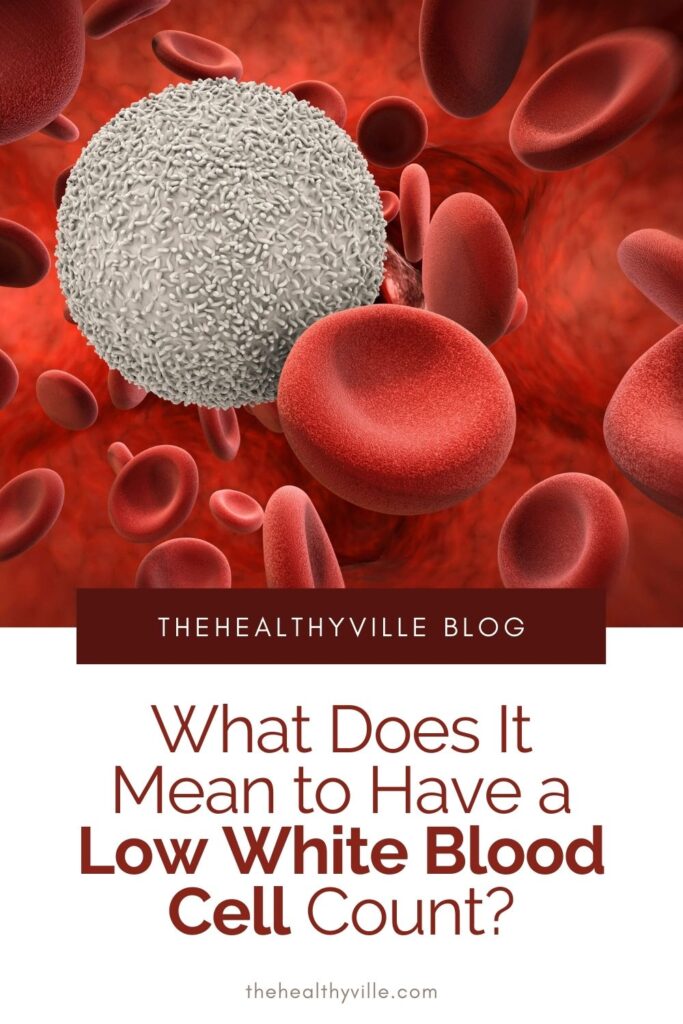What does it mean to have a low white blood cell count? It is a symptom that must be carefully examined in order to determine what is causing it.
White blood cells are part of the body’s immune system and therefore play a protective role against infection. These cells are the first to respond when a foreign agent appears and go to the exact site of infection to destroy it.
The low white blood cell count is not in itself a disease, but it can be the symptom of some pathology. In fact, it can indicate that the body is more vulnerable to infections and bacteria, as the immune system is weakened.
The normal number of white blood cells in the blood is not an exact number. On the one hand, it depends on age; on the other, there are people who have a low count in relation to the usual average, but do not have any health problems. Therefore, the count alone does not yield definitive conclusions.
What does it mean to have a low white blood cell count?
White blood cells fight external agents and protect the body from diseases.
Low white blood cell count, leukocytopenia or leukopenia, is a decrease in the presence of white blood cells, or leukocytes, in the blood. There are several types of white blood cells, which are mainly classified into two groups:
- Polymorphonuclear. They include neutrophils, eosinophils, and basophils.
- Lymphocytes and monocytes.
The most numerous white blood cells are neutrophils and lymphocytes. When wondering what does it mean to have a low blood cell count, it usually means a decrease in neutrophils or lymphocytes. In the first case, we speak of neutropenia; in the second case, lymphocytopenia.
Generally, a low white blood cell count is estimated to exist when there are fewer than 4,000 per cubic millimeter of blood.
Types of low white blood cell count
There are several types of low counts, corresponding to the types of blood cells:
Neutropenia. It is the most common and involves a low neutrophil count. These cells basically fight against infections caused by fungi and bacteria. If the number is less than 1,000 or 1,500 per cubic millimeter of blood, the count is low.
- Lymphocytopenia. It involves a low lymphocyte count which basically fights viral infections. Whene there are less than 1,000 lymphocytes for every cubic millimeter of blood, you have this type of low white blood cell count.
- Monocytopenia. It is the low count cells, called monocytes, that help regulate the body’s immune response and help eliminate damaged tissues. Less than 150 per cubic millimeter of blood indicate it.
- Eosinopenia. It is the low count of cells, called eosinophils, that act in allergic reactions, infections and other diseases. It occurs when they are less than 50 per cubic millimeter of blood.
- Basopenia. When basophils, the cells that act mainly in parasitic infections and allergic reactions, are present in less than 20 per cubic millimeter of blood.
Causes and symptoms
The presence of unexplained symptoms, such as excessive fatigue, is a reason for medical consultation.
The causes of leukopenia are very diverse and, in many cases, the problem is even corrected without ever knowing the reason that produced it. However, an infection is often the reason for the low white blood cell count.
Also, it is relatively common that it is due to an autoimmune disease, such as lupus, Felty’s syndrome, etc. It can also be the result of some form of cancer, particularly leukemia, or chemotherapy or radiotherapy to treat these conditions. Some medications cause a reduction in white blood cells.
A person with leukopenia may present symptoms such as migraine, general malaise, vertigo, weakness, fever, mood changes, diarrhea, extreme fatigue or tiredness and swollen glands, among others. To detect this condition, it is enough to perform a blood test in the laboratory.
What to do?
Treatment for leukopenia varies depending on the severity of it and the cause that produces it. The first thing to determine is precisely the underlying pathology.
Vitamin supplements and steroids to stimulate the functioning of the bone marrow, the place where white blood cells are generated, are sometimes prescribed.
Healthy habits are the most appropriate measure to prevent leukopenia. Healthy practices stimulate the body and normal metabolism. Frequent physical activity, a diet rich in fruits and vegetables, water consumption, care of personal hygiene and enough hours of sleep each night are advisable.
Of course, if you experience unexplained fatigue, weakness, fever or migraine, have a medical visit. Only the professional is capable of evaluating the general physical condition and making an adequate diagnosis.
A diagnosed low white blood cell count. It will be the doctor who investigates the reasons and, later, influences them to work the root problem. For this reason, medical consultation is vital.
Don’t forget to SHARE what does it mean to have a low blood cell count with your friends and family on your social networks!

